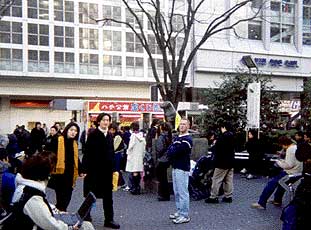by Sara Ellis
|
Excluding women and sexual or religious minorities, Japan is a country where even white foreigners often have their first experience with discrimination. Certain establishments openly post signs that read "Japanese only." And currently a lawsuit stands against a sento (public bathhouse) in Otaru, Hokkaido for refusing service to foreigners. The bathhouse argues that drunken Russian sailors have continually disrespected the bathhouse rules and been rude to Japanese patrons. However, hakujin (white foreigners) tend to experience mixed messages of both privilege and prejudice. While there are some incidents of universal discrimination, many white foreigners are often given a special status not allowed to non-white foreigners. The school where I work holds an annual English summer camp in the wealthy resort area of Yatsugatake. Every year, the school shuttles bus loads of Japanese junior and senior high school students up to the mountains for three days of hiking, cook-outs and various other activities with foreign camp counselors. Recruited from the International University of Japan, the counselors are usually business students who hail from nearby Asian countries such as Mongolia, China, Vietnam, India and Pakistan. The program provides an excellent opportunity for the students to not only improve their English, but also experience its significance as a tool for global communication. This year, unfortunately, the students are going to lose that chance. The school has now decided to hire only "native speakers" - Caucasian Americans, British, Australians and Canadians - in response to several alleged student complaints that these non-native guides are too difficult to understand. Despite the fact that native speakers themselves vary widely in accents (did anyone understand "Trainspotting" on the first go?) and that these "non-natives" from other parts of Asia are often more fluent than many members of the Japanese English faculty, the school has opted for image over education. It's the same strategy that covers ads for English conversation schools with blond-hair, blue-eyed instructors, puts Brad Pitt in coffee commercials, and makes blue contact lenses a popular fashion item for Japanese school girls. This scheme relies on an assumed preference for the westerner stereotype, and an ignorance of multi-cultural societies. To the frustration of many non-white foreigners living in Japan, this prejudice is all too real.
"Japanese people often express surprise when I tell them I'm from Canada," says S.I., an Indo-Canadian English teacher. "These people believe that only white people come from English speaking countries and that only they are qualified to teach. I've had a former student of mine tell me that I am not a native speaker because my appearance does not represent a true native speaker. Also, in many interviews I've had with potential students they have also wondered how it is that my family lives in Canada." Ken Margetts, a Caucasian-American, married to a Filipino woman encountered this blatant double standard at a Chiba supermarket. "My wife informed me that she had found a supermarket with a "No Foreigners Allowed" sign posted on the door," says Margetts. When Margetts went to the store and discovered he was able to shop without incident, he decided to take the issue up with the manager. "I wanted to know why I hadn't been thrown out. I explained I took great offense to the sign, and that if they had a policy of not allowing foreigners to shop there, then I wanted them to enforce their policy." The manager calmly informed Margetts that foreigners like him are welcome. The store just didn't want any of those "Middle Eastern foreigners" on the premises. Posing as a reporter bent on exposing the store's discriminatory practices, Margetts returned the next day and began openly snapping photos of the sign. It was quickly removed from the premises the very next day. But such incidents speak to the casual nature with which Japanese business owners carry out such practices, simply for lack of being called on them. In a nation that prides itself on its homogenous nature, it takes direct confrontation to make discriminating shopkeepers even aware of their wrongdoing. In the case of living accommodations, incidents of such discrimination abound. Japanese landlords are notorious for refusing to rent to gaijin (foreigners) of any background. But for non-white foreigners, finding a flat can be just that much harder. The landlord at the apartment building where I am now living seemed fine with the idea of my moving in. She states magnanimously that a British person had occupied the same apartment some years before. She then went on to say it was the Chinese she didn't want living there. "They would certainly crowd the apartment with a horde of noisy family members," she explains. Luis Ramos, a Puerto Rican living near Yokota air base, had to endure real estate agents whose questions were downright insulting. "I had an experience with the real estate agencies of Akishima," he recalls. "One of them asked my wife if I was black and made a comment that I was too dark. It happens that I am Puerto Rican, of fair complexion, neither white nor black." |

